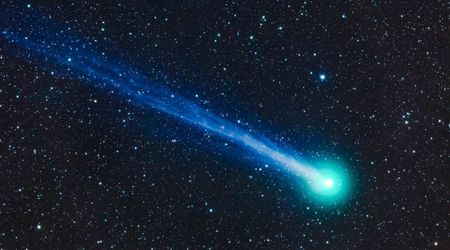International Ax-4 crew to be accompanied by 'Joy,' a soft toy, as their zero-gravity indicator

When the international crew of Axiom Mission Ax-4 launches into space this Wednesday, June 11, a plush swan named "Joy" will accompany them as their zero-gravity indicator. This tradition involves releasing a small, tethered doll that floats freely once the spacecraft reaches low Earth Orbit, signalling the crew's safe arrival. The Ax-4 crew, consisting of American commander Peggy Whitson, Indian pilot Shubhanshu Shukla, Polish mission specialists Sławosz Uznański-Wiśniewski, and Tibor Kapu of Hungary, chose the swan, which is referred to as a "स्वैन" in Hindi, a "łabędź" in Polish, or a "hattyú" in Hungarian. "Joy" will be aboard the SpaceX Dragon capsule for their journey, per Space.com.

"Joy," the baby swan, chosen as the Axiom Mission 4 crew's zero-gravity indicator, embodies the collaborative efforts of the Indian Space Research Organization (ISRO), the European Space Agency (ESA), and the Hungarian to Orbit program (HUNOR). As Axiom Space describes, " Joy represents cultural unity as three nations realize the return to human spaceflight, together as one crew."

The crew's selection of a swan was deliberate, as the bird carries similar symbolic weight across their respective cultures. As Commander Whitson explained during a pre-launch briefing on Tuesday, June 3,"'Joy' represents the shared aspirations of three nations united in their return to human spaceflight. This one is rich in cultural symbolism. It stands for wisdom in India, resilience in Poland, and grace in Hungary. Through 'Joy,' we'll celebrate our diversity and our unity in the shared journey of space exploration."
The crew of Axiom-4 have chosen a white baby swan plush toy named "Joy" as the Zero-G indicator for this mission! 🦢
— ISRO Spaceflight (@ISROSpaceflight) June 8, 2025
Swan is the vehicle of the Hindu goddess Saraswati and represents wisdom & purity. 🕉
Mission Pilot Shubhanshu Shukla's 6 y/o son Kiash (aka Sid) also played a… pic.twitter.com/5WFlQQBVoP
.@NASA, @Axiom_Space, and @SpaceX are standing down from the launch opportunity on Tuesday, June 10, of Axiom Mission 4 to the @Space_Station due to forecasted weather conditions in the ascent corridor along the flight path of the SpaceX Dragon spacecraft.
— NASA Space Operations (@NASASpaceOps) June 9, 2025
Teams are targeting no… pic.twitter.com/BVMsDYoMmh
On the other hand, Indian pilot Shubhanshu Shukla elaborated on the Swan's significance in his culture: "In Indian culture, the swan is the vehicle of Goddess Saraswati, symbolizing wisdom, learning, and purity. It is said to have the rare ability to separate milk from water, a symbolism that is a powerful reminder of discernment in an age of distraction. To carry the symbol is to carry the essence of our mission: pursuit of knowledge, clarity of purpose, and grace under pressure." Polish mission specialist Sławosz Uznański-Wiśniewski also expressed his excitement, stating, "The biggest journey is about to start in just a couple of days. I still do not realize how big this moment will be." He further added, "This will be such a joy, just as the name of our extra passenger in our Dragon and on the ISS."
SpaceX's private Ax-4 mission, carrying four astronauts to the International Space Station, is now set to launch on Wednesday, June 11, at 8:00 a.m. EDT (1200 GMT) from NASA's Kennedy Space Center in Florida, with a backup opportunity for flight available on Thursday, June 12, at 7:37 a.m. ET, as per SpaceX. The launch, originally planned for Tuesday, June 10, was postponed due to high winds. This mission marks Axiom Space's fourth crewed journey to the ISS, utilizing a brand-new SpaceX Crew Dragon capsule for its inaugural flight. Leading the mission is Commander Peggy Whitson, Axiom's director of human spaceflight and a former NASA astronaut, who holds the record for most days in space by an American with 675 days. She is joined by pilot Shubhanshu Shukla of India, Polish mission specialist Sławosz Uznański (representing the European Space Agency), and Hungarian mission specialist Tibor Kapu. Notably, Shukla, Uznański, and Kapu will make history as the first individuals from their countries to reside on the ISS.









